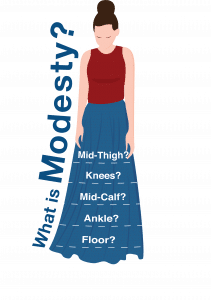“I think one of the most hurtful questions that people have asked me about my rape was what I was wearing, as if it would have any kind of implications on whether or not or to what degree it was okay.”
Director of Academic Resources Stephanie O’Brian sat in her office filled with colorful wall-hangings and pictures of loved ones. In the corner was a stack of posters, the one on top reading, “Rape: Consent is Not a Blurred Line.” These posters were used to promote Harding’s first-ever Sexual Assault Awareness Week in April of 2017.
“It is a victim blaming question,” O’Brian said, “and for the record I was wearing jeans and a hoodie the night I was raped. There’s nothing provocative about that. No matter what, even if you do dress ‘provocatively,’ you’re not asking for it. I view (dress) as an expression of self. I also think that as a woman, I should not be held accountable for a man’s thoughts, and if they cannot control their thoughts and their lust, then that’s on them.”
The belief that a woman is responsible for a man’s thoughts is a common one in Christian culture, according to O’Brian. This starts with teaching young children in churches and homes about what it means to be male and female, beginning with modesty.
Modesty, from the Latin root modestus means “keeping within measure,” and according to Merriam-Webster is defined as “propriety in dress, speech, or conduct.”
According to Dr. Beth Wilson, a recently-retired professor in Harding’s Family and Consumer Science Department, men and women respond differently to what they see, making modesty a critical topic. Wilson taught family relationships among other courses at Harding and works with Hope Cottage, a local shelter for women and children who are survivors of domestic abuse.
“I think women have a responsibility to be sure that they are not dressing in such a way that just the visual image starts the attraction sexually,” Wilson said.
O’Brian said some Christian teachings of modesty reflect a mindset in which women must protect men from lusting after their bodies. During interviews with 8- and 9-year-olds at Harding Academy, female students were asked what modesty meant to them.
“You don’t exactly have to dress nice, you just don’t wear things too short, like almost up to your waist,” third-grade student Maddie said.

Graphic by Darrian Bailey
While some students did not understand why they should not wear certain clothing, they each had clear boundaries on what they considered appropriate dress.
“I don’t really know what (modesty) means, but I would say wear shorts 3 inches above the knee and a T-shirt, short-sleeved,” third-grade student Shelby said. “Just make sure that it isn’t showing too much.”
According to O’Brian, there are a few key Biblical passages that Christians use to teach modesty, such as Proverbs 31 and its description of a virtuous woman: “Charm is deceptive, and beauty is fleeting; but a woman who fears the Lord is to be praised.” O’Brian also mentioned the phrase “stumbling block” that is often used to refer to women dressed inappropriately.
“Well I think that both men and women can be a stumbling block. I think dress is a part of that,” Wilson said. “We can’t control how others respond. But we can honestly look at what we’re wearing and what we’re doing and the image that is being portrayed so we each have to be accountable. If it causes our brother or sister to stumble in any way then it is a problem.”
Wilson said she believes the issue has gotten out of control in today’s society and added she did not often “see much immodest dress among the young men.” Like the Harding Academy students, Wilson described her personal parameters when it comes to clothing and said that she tries to instill these in her female students.
“I look at modesty from a Biblical standpoint, and to me I think it’s not exactly what you wear,” Wilson said. “But you know, we are supposed to reflect Christ, and so I think it goes beyond what I might call provocative apparel. I think any time that we draw attention to ourselves, I don’t think that’s a reflection of what we’re called on to do. I hope modesty causes people to see the inner qualities rather than just my outward appearance.”
This is the first installment of “The M Word” series. The second will appear in the next edition of The Bison, on stands Nov. 10.